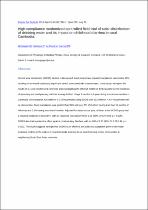 ResearchSpace
ResearchSpace
High compliance randomized controlled field trial of solar disinfection of drinking water and its impact on childhood diarrhea in rural Cambodia
JavaScript is disabled for your browser. Some features of this site may not work without it.
- ResearchSpace
- →
- Research Publications/Outputs
- →
- Journal Articles
- →
- View Item
| dc.contributor.author |
McGuigan, KG

|
|
| dc.contributor.author |
Samaiyar, P

|
|
| dc.contributor.author |
Du Preez, M

|
|
| dc.contributor.author |
Conroy, RM

|
|
| dc.date.accessioned | 2011-11-15T10:39:54Z | |
| dc.date.available | 2011-11-15T10:39:54Z | |
| dc.date.issued | 2011-09 | |
| dc.identifier.citation | McGuigan, KG, Samaiyar, P, Du Preez, M and Conroy, RM. 2011. High compliance randomized controlled field trial of solar disinfection of drinking water and its impact on childhood diarrhea in rural Cambodia. Environmental Science & Technology, Vol 45(18), pp 7862-7867 | en_US |
| dc.identifier.issn | 0013-936X | |
| dc.identifier.issn | 1520-5851 | |
| dc.identifier.uri | http://www.ncbi.nlm.nih.gov/pubmed/21827166 | |
| dc.identifier.uri | http://hdl.handle.net/10204/5290 | |
| dc.description | Copyright: 2011 American Chemical Society. ABSTRACT ONLY | en_US |
| dc.description.abstract | Recent solar disinfection (SODIS) studies in Bolivia and South Africa have reported compliance rates below 35% resulting in no overall statistically significant benefit associated with disease rates. In this study, the authors report the results of a 1 year randomized controlled trial investigating the effect of SODIS of drinking water on the incidence of dysentery and nondysentery diarrhea among children of age 6 months to 5 years living in rural communities in Cambodia. They compared 426 children in 375 households using SODIS with 502 children in 407 households with no intervention. Study compliance was greater than 90% with only 5% of children having less than 10 months of follow-up and 2.3% having less than 6 months. Adjusted for water source type, children in the SODIS group had a reduced incidence of dysentery, with an incidence rate ratio (IRR) of 0.50 (95% CI 0.27-0.93, p = 0.029). SODIS also had a protective effect against nondysentery diarrhea, with an IRR of 0.37 (95% CI 0.29-0.48, p < 0.001). This study suggests strongly that SODIS is an effective and culturally acceptable point-of-use water treatment method in the culture of rural Cambodia and may be of benefit among similar communities in neighboring South East Asian countries. | en_US |
| dc.language.iso | en | en_US |
| dc.publisher | American Chemical Society | en_US |
| dc.relation.ispartofseries | Workflow request;7427 | |
| dc.subject | Recent solar disinfection | en_US |
| dc.subject | Diarrhea | en_US |
| dc.subject | Water treatment methods | en_US |
| dc.subject | Infected water | en_US |
| dc.subject | Drinking water disinfection | en_US |
| dc.subject | Childhood diarrhea | en_US |
| dc.subject | Rural Cambodia | en_US |
| dc.title | High compliance randomized controlled field trial of solar disinfection of drinking water and its impact on childhood diarrhea in rural Cambodia | en_US |
| dc.type | Article | en_US |
| dc.identifier.apacitation | McGuigan, K., Samaiyar, P., Du Preez, M., & Conroy, R. (2011). High compliance randomized controlled field trial of solar disinfection of drinking water and its impact on childhood diarrhea in rural Cambodia. http://hdl.handle.net/10204/5290 | en_ZA |
| dc.identifier.chicagocitation | McGuigan, KG, P Samaiyar, M Du Preez, and RM Conroy "High compliance randomized controlled field trial of solar disinfection of drinking water and its impact on childhood diarrhea in rural Cambodia." (2011) http://hdl.handle.net/10204/5290 | en_ZA |
| dc.identifier.vancouvercitation | McGuigan K, Samaiyar P, Du Preez M, Conroy R. High compliance randomized controlled field trial of solar disinfection of drinking water and its impact on childhood diarrhea in rural Cambodia. 2011; http://hdl.handle.net/10204/5290. | en_ZA |
| dc.identifier.ris | TY - Article AU - McGuigan, KG AU - Samaiyar, P AU - Du Preez, M AU - Conroy, RM AB - Recent solar disinfection (SODIS) studies in Bolivia and South Africa have reported compliance rates below 35% resulting in no overall statistically significant benefit associated with disease rates. In this study, the authors report the results of a 1 year randomized controlled trial investigating the effect of SODIS of drinking water on the incidence of dysentery and nondysentery diarrhea among children of age 6 months to 5 years living in rural communities in Cambodia. They compared 426 children in 375 households using SODIS with 502 children in 407 households with no intervention. Study compliance was greater than 90% with only 5% of children having less than 10 months of follow-up and 2.3% having less than 6 months. Adjusted for water source type, children in the SODIS group had a reduced incidence of dysentery, with an incidence rate ratio (IRR) of 0.50 (95% CI 0.27-0.93, p = 0.029). SODIS also had a protective effect against nondysentery diarrhea, with an IRR of 0.37 (95% CI 0.29-0.48, p < 0.001). This study suggests strongly that SODIS is an effective and culturally acceptable point-of-use water treatment method in the culture of rural Cambodia and may be of benefit among similar communities in neighboring South East Asian countries. DA - 2011-09 DB - ResearchSpace DP - CSIR KW - Recent solar disinfection KW - Diarrhea KW - Water treatment methods KW - Infected water KW - Drinking water disinfection KW - Childhood diarrhea KW - Rural Cambodia LK - https://researchspace.csir.co.za PY - 2011 SM - 0013-936X SM - 1520-5851 T1 - High compliance randomized controlled field trial of solar disinfection of drinking water and its impact on childhood diarrhea in rural Cambodia TI - High compliance randomized controlled field trial of solar disinfection of drinking water and its impact on childhood diarrhea in rural Cambodia UR - http://hdl.handle.net/10204/5290 ER - | en_ZA |





